Through the
years, cinema has brought us many offerings concerning killer kids. Tales of
terrible tykes attacking trusting adults was nothing new by 1980, and that was
the year that brought us THE CHILDREN, a low budget oddity that arrived in the
midst of a slasher film craze. Nearly forgotten by horror fans, THE CHILDREN
is one of those independently-made films that made decent money when it came
out, was released briefly on home video, and played on TV, most notably in prime
time on USA Network’s “Saturday Nightmares” program. It’s
one of those films that’s hard to forget, and the ones who did see it
many moons ago have been aching for a DVD release, so they could once again
be horrified and amused at the same time.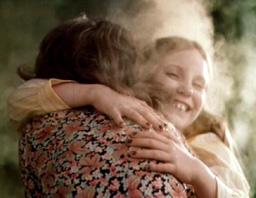
In the small peaceful town of Ravensback, a nearby nuclear power plant has an accidental leak. This causes an orange mist that a school bus with five children rides into it, and the outcome is something dreadful. The five kids disappear for a while, and the bus driver is found dead in the town cemetery, with his flesh looking like “Eggplant Parmigiana.” The sheriff and his deputy try desperately to locate the missing children, and it's soon discovered that they have become zombified menaces with black fingernails: their instant touch blisters and burns their victims to a bloody, unrecognizable pulp.
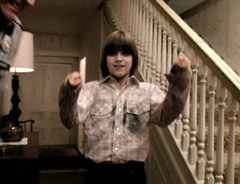 THE
CHILDREN is a sometimes creepy, sometimes unintentionally laughable effort that
will at the very least, make an impression on the viewer. The plot evokes 1950s
sci-fi ideology, as well as taking direct inspiration from NIGHT OF THE LIVING
DEAD, especially when three adults lock themselves in a house and from a window,
shoot at the monstrous kids slugging on the lawn. The thought of pre-teens welcoming
their folks with open arms, only to end their lives in a most grotesque manner,
is a disturbing one, and the make-up on these burn victims is excellent. The
way to stop these pint-sized pests: cut off their nail-polished hands, which
unveil some not so convincing effects, with prosthetic extremities being lopped
from extended arm stubs. The film does have its moments, and is unrelentless
as far as killing off characters young and old, and this makes it pretty unpredictable
until the final scene.
THE
CHILDREN is a sometimes creepy, sometimes unintentionally laughable effort that
will at the very least, make an impression on the viewer. The plot evokes 1950s
sci-fi ideology, as well as taking direct inspiration from NIGHT OF THE LIVING
DEAD, especially when three adults lock themselves in a house and from a window,
shoot at the monstrous kids slugging on the lawn. The thought of pre-teens welcoming
their folks with open arms, only to end their lives in a most grotesque manner,
is a disturbing one, and the make-up on these burn victims is excellent. The
way to stop these pint-sized pests: cut off their nail-polished hands, which
unveil some not so convincing effects, with prosthetic extremities being lopped
from extended arm stubs. The film does have its moments, and is unrelentless
as far as killing off characters young and old, and this makes it pretty unpredictable
until the final scene.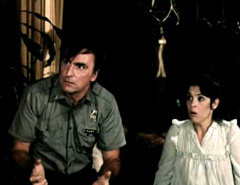
Shot on the East Coast (mostly in Massachusetts) and taking place primarily at night, THE CHILDREN boasts most of the same crew who went on to Sean Cunningham’s FRIDAY THE 13TH, released the same year. Even the music, with all its screeching PSYCHO-esqe violins, was scored by Harry Manfredini, and it almost sounds identical to his first FRIDAY soundtrack. The kids hired for the film were non-actors (two of them were the producer’s son and daughter), and despite seeing one or two of them smirk at the camera every once in a while, they pull it off effectively. The small-town sheriff is played excellently by Gil Rogers, who holds the film together, and it was wise to make him concerned and sympathetic, rather than the usual bumbling hick imbecile. The primary adult couple is played by Martin Shakar (John Travolta’s priest brother in SATURDAY NIGHT FEVER), whose character changes drastically within the course of events, and Gale Garnett (the voice of “Francesca” in MAD MONSTER PARTY) as the pregnant wife in denial that her eldest daughter is now a “thing.”
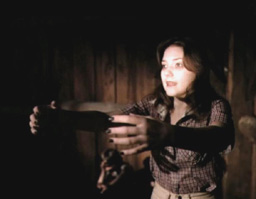 Hyped
as a 25th Anniversary Special Edition, Troma’s transfer for THE CHILDREN
is a big disappointment. First off, its presented full frame rather than the
original 1.85:1, and hard mattes pop up on the top of the screen several times.
Colors look somewhat faded, and nighttime scenes are often too dark. The 35mm
elements used for the transfer are in rough shape, with lots of dirt and debris,
lines, and other blemishes. Reel changes become horrid looking, and damage causes
some frames to be missing. The mono audio has clear dialogue and vibrant music,
but is full of hiss and pops. It’s the kind of transfer that makes you
wish you kept your old VHS copy.
Hyped
as a 25th Anniversary Special Edition, Troma’s transfer for THE CHILDREN
is a big disappointment. First off, its presented full frame rather than the
original 1.85:1, and hard mattes pop up on the top of the screen several times.
Colors look somewhat faded, and nighttime scenes are often too dark. The 35mm
elements used for the transfer are in rough shape, with lots of dirt and debris,
lines, and other blemishes. Reel changes become horrid looking, and damage causes
some frames to be missing. The mono audio has clear dialogue and vibrant music,
but is full of hiss and pops. It’s the kind of transfer that makes you
wish you kept your old VHS copy.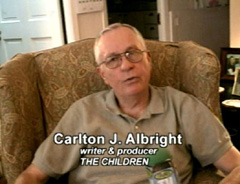
At least there’s some decent extras here. First off is a running commentary with producer/co-writer Carlton J. Albright, who remembers a lot about making the film. He discusses the cast, locations, and throws in some fun anecdotes, including one about a trained Doberman who kept screwing up a key scene. There are also four short featurettes on the disc that are good enough to make you wish they were a little longer. The first one (7 minutes) has Albright by himself covering some of the things he discussed in the commentary. He describes how director Max Kalmanowicz (not his original choice) was a big disappointment to just about everyone who worked on the film, casting his children in the film, and the reception it got when it premiered in theaters. The next featurette (3 minutes) has Albright joined with production manager David Platt who talks about how the film launched his career (he’s now a director on the various “Law & Order” series). Lead actor Gil Rogers joins Albright and his wife Patricia (she supervised the child actors on the set) for the third featurette (3 minutes). Rogers remembers the film fondly, but also talks a bit about his career (he was up for Burt Reynolds’ part in DELIVERANCE!). The last featurette, which is also the longest, interviews Stan Richardson, creator of an off-Broadway musical based on THE CHILDREN. Since the same treatment was given to PLAN NINE FORM OUTER SPACE, LITTLE SHOP OF HORRORS and REEFER MADNESS, this is a surefire sign of THE CHILDREN’s strong cult status. Some scenes from the musical (going back to 1998) supplement the interview.
In a forced
intro, Troma-head Lloyd Kaufman presents the film (from Iceland!) as “digitally
remastered,” and this is surely some kind of a joke! He introduces someone
as an authority on THE CHILDREN who turns out to be an Icelandic video clerk:
his conversation to the camera is quickly dubbed over in an absurd comic manner.
What’s the point of all this? There’s a number of Troma-related
promotional stuff here as well, but you’ll also find trailers for other
Albright productions such as LUTHER THE GEEK and DREAMS COME TRUE.
(George
R. Reis)